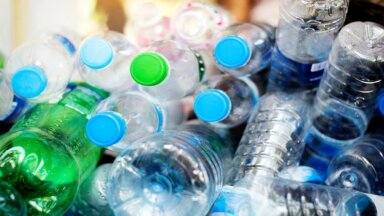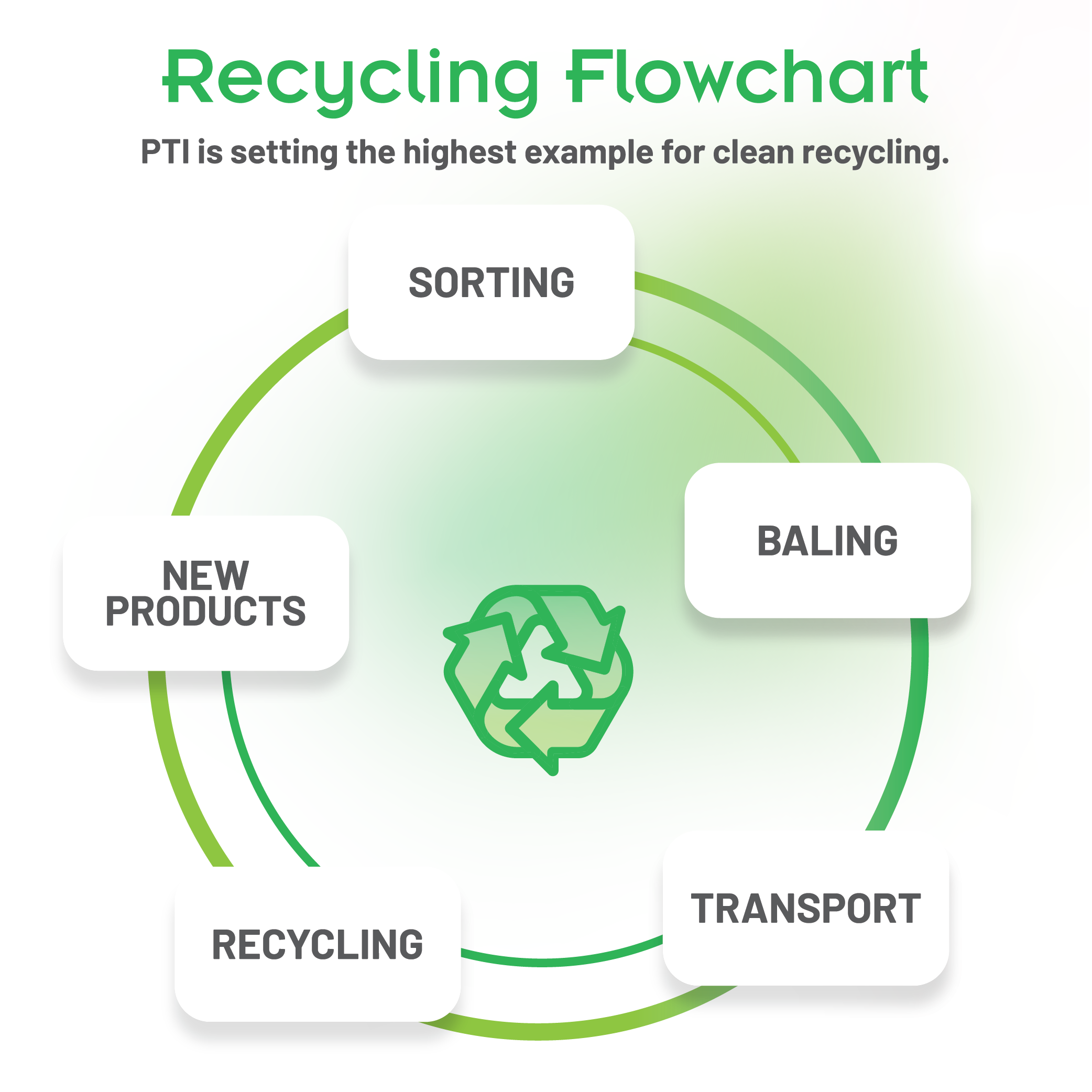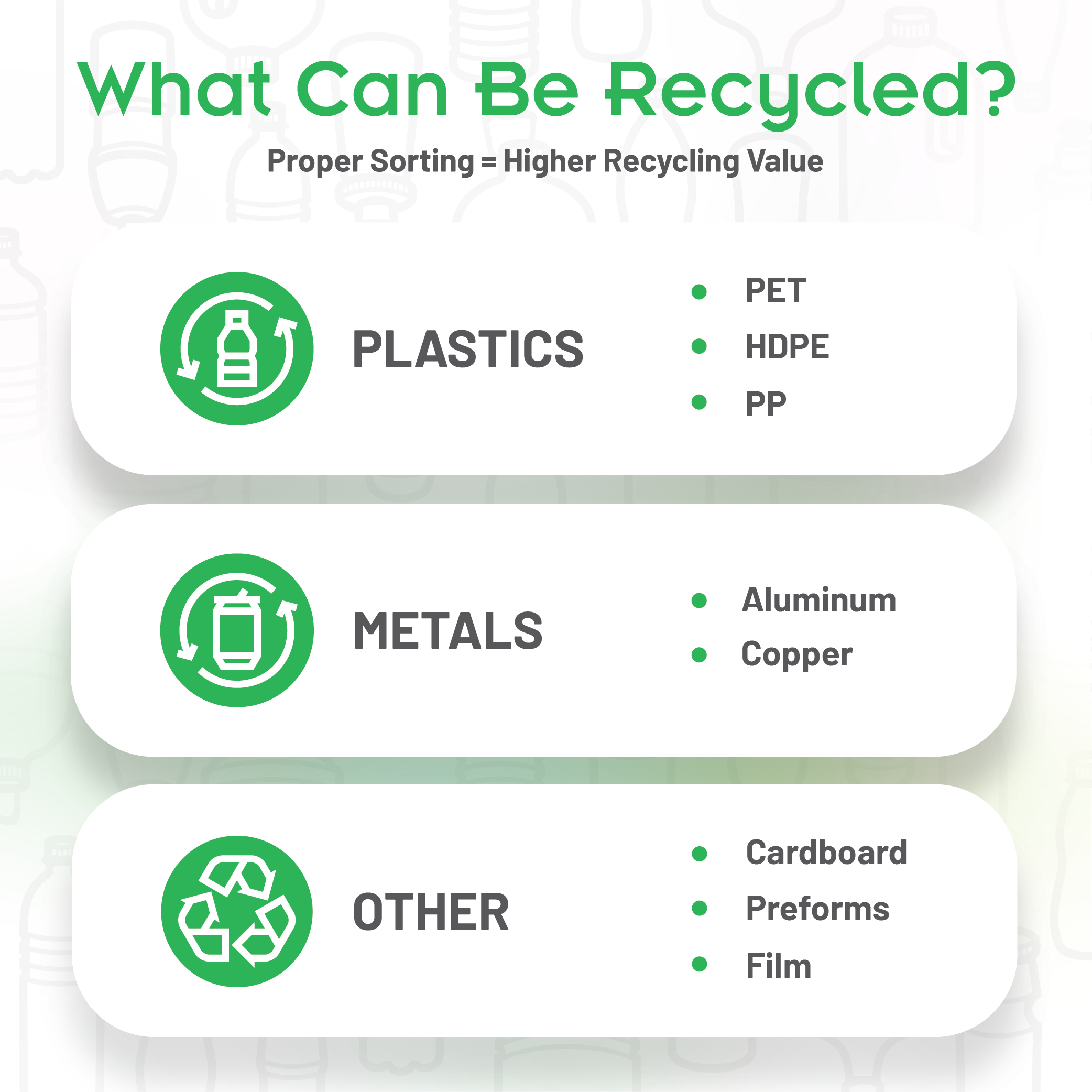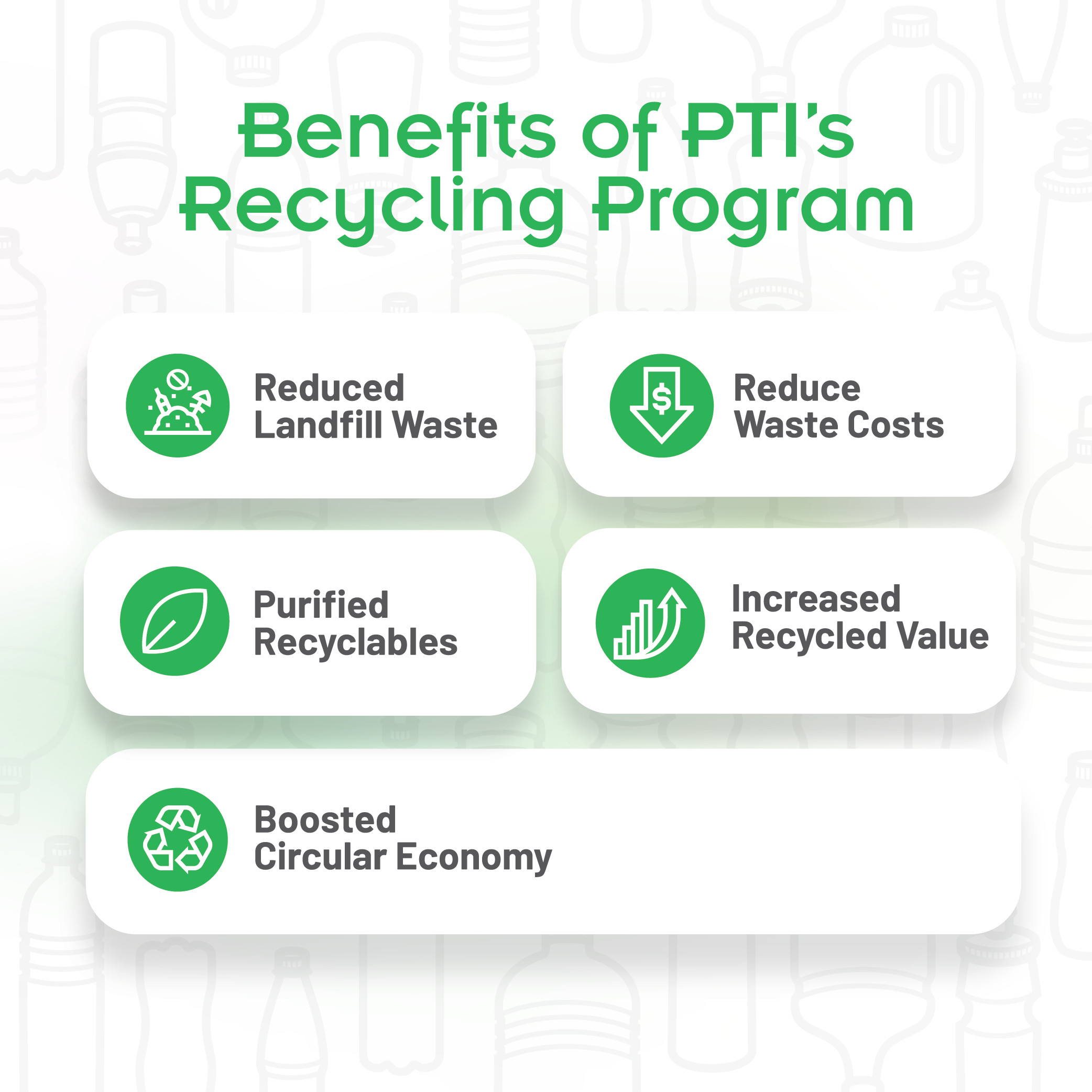At Plastic Technologies, Inc. (PTI), we recognize the urgent need to address the global plastic waste crisis. The world generates millions of tons of plastic waste each year, yet a significant portion never makes it to a recycling facility. Much of it ends up in landfills or oceans due to contamination, lack of infrastructure, and consumer misconceptions. The need for sustainable packaging technology and advanced plastics recycling solutions has never been more critical.
Currently, only 5-6% of plastic used in the U.S. gets recycled, as many plastic types have differing chemical compositions that prevent mixed recycling (Times Union). This highlights the inefficiencies of traditional recycling methods and the need for innovative solutions like PTI’s advanced recycling program.
As a global leader in plastic processing, PTI is committed to transforming the way the industry handles recycling. We’re not just recycling plastics—we’re ensuring that all recyclable materials, from cardboard to metals, are properly processed. Our latest initiative is redefining recycling infrastructure, proving that responsible waste management is achievable at scale.
The Challenge with Secondary Plastics Recycling
What Are Secondary Plastics?
Secondary plastics include materials like:
- Flexible films
- Plastic wraps and bubble wrap
- Grocery bags and other soft plastics
Unlike traditional post-consumer recycled (PCR) plastics, these materials are often excluded from municipal waste management programs due to contamination concerns and limited processing capabilities. In fact, many items that people try to recycle are not suitable candidates due to improper sorting and material composition issues (Times Union).
PTI’s View on Industry-Wide Challenges
- Material Contamination: Recyclable plastics must be clean and dry. Contaminated materials reduce the quality of recycled materials, making them harder to reuse.
- Infrastructure Gaps: Many recycling centers lack the technology to process secondary plastics, leading to an uneven recycling system that varies by region.
- Public Misconceptions: Many consumers assume all plastics are recyclable, leading to contamination in recycling bins and inefficiencies in sustainable packaging initiatives.
PTI’s Commitment: A New Approach to Recycling
Why PTI Took the Lead
At PTI, we believe in leading by example. As a company deeply involved in plastic processing training, packaging development, and testing, we understand the environmental responsibility of proper recycling. Rather than waiting for industry-wide change, PTI’s team took action by implementing our own advanced industrial recycling solutions. Charlotte Laney and Shachi Vaish lead PTI’s corporate sustainability strategy and logistics.
Beyond plastics, PTI also ensures that other recyclable materials—such as cardboard, aluminum, and copper—are sorted and processed correctly.
How PTI’s Recycling Initiative Works
- Collaboration with a Local Recycling Partner:
- PTI partnered with a sustainable packaging consultant after connecting at a trade show.
- The recycler provided a baler and trailer recycling system to help PTI efficiently manage large volumes of recyclable materials.
- Sorting and Processing at PTI:
- Our warehouse now has a dedicated sorting area for handling recyclables.
- Employees separate materials like plastic wrap, bubble wrap, and grocery bags into specialized bins before processing.
What Can Be Recycled Through PTI’s Program?
Accepted Materials
- Plastics: PET, HDPE, PP bottles, bubble wrap, plastic wrap, grocery bags (sorted in Gaylord containers).
- Metals: Aluminum, copper, and other scrap metals.
- Other Recyclables: Cardboard, packaging preforms, and plastic resins.
Materials That Cannot Be Processed
- New polymer formulations currently in testing.
- Batteries, which require specialized disposal.
Environmental and Economic Impact: The PTI Advantage
Environmental Benefits
- Less Waste in Landfills: By recycling secondary plastics, PTI significantly reduces the volume of waste sent to landfills.
- Cleaner Recycling Streams: Our focus on proper sorting and clean bales results in higher-quality recycled materials, making them more valuable for reuse.
Economic Benefits for Businesses
- Lower Waste Management Costs: Properly sorted recyclables reduce landfill fees for businesses.
- Higher Value for Recycled Materials: Clean, uncontaminated recyclables are worth more in the recycling market.
How Recycled Materials Are Used: Real-World Applications
After processing, PTI’s recycled materials are transformed into:
- Carpets, curtains, and car parts in the automotive and home industries.
- Plastic packaging for new consumer products.
Long-Term Vision
PTI plans to expand our recycling partnerships, allowing more businesses to reuse secondary plastics efficiently.
The Logistics: How It All Comes Together at PTI
Collection & Pickup Process
- A trailer is stationed in PTI’s warehouse for continuous loading.
- Once full, the recycling partner swaps the trailer for an empty one, ensuring a seamless recycling flow.
Processing On-Site
- Special bins help employees sort materials before baling.
- PTI continuously refines its process to maximize efficiency and minimize waste.
PTI’s Role in Shaping the Future of Recycling
Educating Employees & Industry Peers
- Our internal training programs teach employees how to properly sort materials.
- We advocate for better industry-wide awareness on flexible plastic recycling.
Advocating for Higher Standards
- PTI pushes for stronger national recycling policies and infrastructure improvements.
Future Expansion Goals
- We aim to scale our program and inspire other manufacturers to adopt similar waste reduction strategies.
Join PTI in Creating a More Sustainable Future
At PTI, we are proving that responsible plastics recycling isn’t just possible—it’s necessary. By leading the charge in sustainable packaging technology and waste management, we are setting the gold standard for industrial recycling solutions.
If your company wants to improve its corporate sustainability efforts, contact PTI today to learn more about our innovative approach to recycling.



